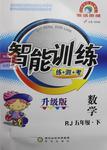题目内容
Long years of hard work made _____ possible for him to enter a key university in Beijing.
| A.that | B.this | C.it | D.which |
C
解析

 激活思维智能训练课时导学练系列答案
激活思维智能训练课时导学练系列答案Robeson was born in a very poor family. At seven, he had to pick coal in a deserted mine near his home, and then he sold__36__he had picked and earned a few coins to help his parents. He had__37__schooling, for being so poor, how could they__38__school fees?
When he was fifteen, he worked__39__a servant in a school. Looking at other children studying in the classroom,he felt__40__for himself. How he__41__to have the same chance! He decided to study by__42__.In the daytime, after the sweeping and cleaning was over, he__43__stand by the window outside the classroom trying to catch what the teacher said. At night, he tried his best to remember what he__44__during the day. He worked__45__hard at his lessons that he sometimes had just three or four hours to sleep. The more he learned, the greater__46__he showed in his lessons. A math teacher discovered him and came to like this diligent boy and__47__him to sit at the back of the class. In one exam, he was the__48__one in the whole school who reached the highest grade. He would have been given the scholarship if he__49__a regular student of the school.
Robeson__50__through six long years with his study of math and wrote several articles which captured the__51__of some university professors. They admired his talent__52__his diligence. To give him a good chance, they hired him as a librarian and__53__him free guidance. Robeson felt__54__, for he was sure that before him there was a broad road__55__success.
| 【小题1】 |
|
| 【小题2】 |
|
| 【小题3】 |
|
| 【小题4】 |
|
| 【小题5】 |
|
| 【小题6】 |
|
| 【小题7】 |
|
| 【小题8】 |
|
| 【小题9】 |
|
| 【小题10】 |
|
| 【小题11】 |
|
| 【小题12】 |
|
| 【小题13】 |
|
| 【小题14】 |
|
| 【小题15】 |
|
| 【小题16】 |
|
| 【小题17】 |
|
| 【小题18】 |
|
| 【小题19】 |
|
| 【小题20】 |
|
As far back as 700 B. C, man has talked about children being cared for by wolves. Romulus and Remus, the legendary(传说的)twin founders of Rome, were said to have been cared for by wolves. It is believed that when a she-wolf loses her litter, she tries to get human child to take its place. This seemingly foolish and unreasonable idea did not become believable until the late nineteenth century when a French doctor actually found a ten-year-old boy having nothing on wandering in the woods. He didn’t walk upright, could not speak understandably, nor could he relate to people. He only growled(嗥叫)and stared at them. Finally the doctor won the boy’s confidence and began to work with him. After many long years of devoted and patient teaching, the doctor was able to get the boy to clothe and feed himself, recognize and say a number of words, as well as write letters and form words.
【小题1】The French doctor found the boy ________.
A. wandering in the woods B at his doorstep
C. growling at him D. speaking understandably
【小题2】In this passage, the word “litter” in line 3 most nearly means ________.
| A.garbage | B.master | C.hair | D.baby animals |
| A.the boy had never lost his mind | B.the boy trusted him |
| C.the boy liked to dress up | D.the boy worked very hard |
| A.She-Wolves have been said to replace human children for their lost litter. |
| B.Examples of wolves caring for human children can be found only in the nineteenth century. |
| C.The French doctor succeeded in training the boy to enjoy the human life somewhat. |
| D.The young boy never was able to speak perfectly. |
| A.tell | B.understand | C.listen to | D.write to |